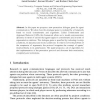1410 search results - page 32 / 282 » The Algorithmics of Solitaire-Like Games |
ATAL
2007
Springer
15 years 5 months ago
2007
Springer
Agents engaged in noncooperative interaction may seek to achieve a Nash equilibrium; this requires that agents be aware of others’ rewards. Misinformation about rewards leads to...
SIGECOM
2006
ACM
15 years 5 months ago
2006
ACM
We present a reduction from graphical games to Markov random fields so that pure Nash equilibria in the former can be found by statistical inference on the latter. Our result, wh...
100
click to vote
ISPDC
2007
IEEE
15 years 5 months ago
2007
IEEE
Scheduling divisible loads in distributed systems is the subject of Divisible Load Theory (DLT). In this paper we show that coalitional game theory is a natural fit for modeling ...
ARGMAS
2004
Springer
15 years 4 months ago
2004
Springer
In this paper we propose a new persuasion dialogue game for agent communication. We show how this dialogue game is modeled by a framework based on social commitments and arguments....
111
click to vote
SAGT
2010
Springer
14 years 9 months ago
2010
Springer
We study the computational complexity of finding stable outcomes in symmetric additively-separable hedonic games. These coalition formation games are specified by an undirected e...

